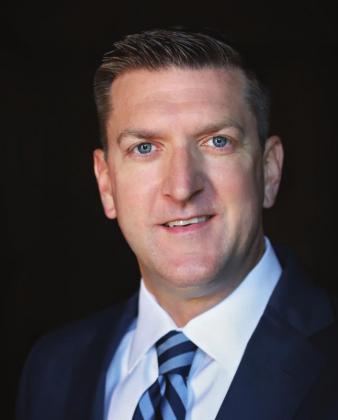Ransom shares mayoral insight of Atlanta
Atlanta Mayor Travis Ransom began his term as mayor in August 2017. Since then, he has worked to improve the quality of life in Atlanta, Texas. Ransom is also an insurance agent at Offenhauser, Inc., and a member of the US Army Reserves. He recently threw his hat in the ring to be the new Cass County Judge.
The Journal-Sun will be meeting with local officials from area towns in an effort to inform the citizens what is happening in their communities. This week Shawn Larson from the Journal-Sun met with Ransom.
Larson: Looking back at 2021 what were some of the important things that happened in the City of Atlanta?
“Our infrastructure took a major hit due to the winter storms early in 2021. Recovering from that was only made possible through the work of our city public works employees who continually go above and beyond to keep things up and running. Our sales tax receipts were up sharply, representing increased local sales at our stores and online shopping. We always recommend keeping your dollars local, but when you can’t find it local, consider shopping online and you’ll still keep your tax dollars local. A substantial amount of debt was retired by all the ancillary taxing entities of the City – those being the AEDC, AC/DC, and Tourism Board. None of those entities have outstanding debt.”
Larson: In your time as mayor what are you the proudest of?
“We’ve made significant improvements in our community. I am most proud of the way that the citizens of Atlanta have in-stilled a sense of pride and ownership in our community. We’ve accomplished many tangible objectives also. We’ve removed a significant amount of blight property, seen growth in residential, commercial, and industrial segments, and lowered our property tax rate twice. A healthy local economy pushed sales tax revenue up which helped us reduce and retire debt early while equipping us to pay cash to make needed updates and repairs to infrastructure.”
Larson: In your opinion what makes Atlanta special?
“Atlanta is “Hometown, USA.” Now, perhaps more than ever, people have begun to realize the value of living and raising a family in a Small Town. We celebrate together when our community shines and we mourn together when we lose a community member. We live life together. We have a caring and giving community that loves one another. It’s not perfect, but it is a great place to call home.”
Larson: As a city, what are some things you believe we need to tackle in the coming years?
“We need to continue to maintain and update our infrastructure. Repair of local streets is an important issue that we will face as a community. Unfortunately, the cost of street repair is so high, the repair program will almost certainly require the issuance of debt. The City Council strives to issue debt when other debt falls off, thereby keeping the property tax rate low. I’d also like to see improvements in our high-speed internet access and look at potential partnerships for additional economic development. As the pandemic lingers on, we also need to be mindful of challenges our rural healthcare providers are facing and recognize the importance of having Cass County’s only Hospital and Emergency Room. Christus St. Michael Hospital-Atlanta is truly a blessing to our community.”
Larson: Along the same lines as the previous question, what are some of the challenges our City has and what should we do to tackle those things?
“As our nation and world seem to continually be descending into chaos, we must not allow those global and national narratives to leach into our local communities. We must focus on policy, not politics. We must strive for good governance, not grandstanding. It is my hope that the City will continue to communicate with transparency, treat everyone the same, and listen to opposing viewpoints when they arise.”
Larson: What businesses and infrastructure do you anticipate in the near future?
“We just received $1.3 million in Coronavirus Relief Funds from the Federal Government. That money has been earmarked for water and wastewater system improvements. That will help ensure services are available as our community grows.”
“As for economic development, we are uniquely situated between Interstate 30 and Interstate 20 with quick access to Interstate 49 and also along future I369 with US Highway 59 being the most highly trafficked non-interstate highway in the nation. As traffic count increases, we will need to look long-term at what that future growth will mean. We will have to deal with a mix of opportunities and challenges. As populations grow, timber will remain a needed commodity and we are well-positioned as a potential distribution point for a multitude of goods.”

